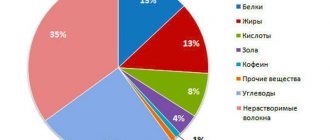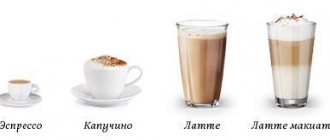Information from the history and etymology of the word “coffee”
In English, the word is written as coffee, pronounced according to the transcription - [ˈkɒfɪ]. “Coffee” is borrowed from a foreign language. It is generally accepted that it is from English, although there are several versions. There is also an opinion that the roots of the origin of the word go back to the Arabic language. In the region of Ethiopia called Kaffa, coffee trees were grown. As a result, the fruits of the plant, as well as the drink made from them, began to be called in a similar way.
In other languages it sounds like this:
- French - cafe;
- German – kaffe;
- Dutch - coffee.
Our ancestors first tried the drink brought by merchants from the Netherlands. They said “kofi” there, so in Rus' they pronounced “kofiy” or “coffee”. The following forms and derivatives have become common: coffee, drink coffee, coffee, kohei, kefa, coffee, coffee, coffee pot.
What gender does the word belong to and why?
Previously, schools taught that the word belongs exclusively to the masculine gender, despite the ending -e and borrowed origin. Then, when doubts arose - coffee is “it’s mine” or “it’s mine” - an unequivocal answer was given. Today the situation has changed dramatically.
The first amendment to this rule was made in 2002 in dictionaries:
- Tolovy, author Dahl (1880-1882);
- Ozhegov's dictionary (1949);
- Efremova (1996).
The officially prescribed amendment stated that it was acceptable to use the word “coffee” as neuter, provided that this occurs exclusively in colloquial speech. This mention first appeared in the “Russian Spelling Dictionary” by the author Lopatin.
Everything flows, everything changes, the Russian language also does not stand still. Surveys and studies are constantly being conducted, which have shown the need for further reforms. On September 1, 2009, the Ministry of Education made several significant changes by order. One of them concerned the name of many people’s favorite drink.
Since 2009, “coffee” has also become neuter. This now applies not only to oral speech, but also to written speech. This year's changes are reflected in the directories:
- “Spelling Dictionary of the Russian Language”, Bukchina, Sazonova, Cheltsova;
- “Grammar Dictionary of the Russian Language: Inflection”, Zaliznyak;
- “Dictionary of accents of the Russian language”, Reznichenko;
- “Large Phraseological Dictionary of the Russian Language”, Telius.
For those for whom the innovation seems unacceptable, it is recommended to use the word as a masculine gender to designate a drink, and as a neuter gender to denote a plant and its fruits.
What is coffee - Meaning of the word coffee
Morphological and syntactic properties
| case | units h. | pl. h. |
| Them. | coffee | coffee |
| coffee | coffee | |
| coffee | coffee | |
| coffee | coffee | |
| TV | coffee | coffee |
| Etc. | coffee | coffee |
coffee
Noun, inanimate, masculine, indeclinable (declension type 0 according to the classification of A. A. Zaliznyak); decomposition is the use as a noun. neuter.
There are also obsolete, simple. spelling options: coffee, coffee.
Root: -coffee-
[Tikhonov, 1996].
Pronunciation
- IPA: [ˈkofʲɪ]
(file)
Semantic properties
Coffee [2] Coffee [3]
Meaning
- nerd. a tropical plant ( tree or shrub
) of the Rubiaceae family, from the seeds of which a tonic drink is prepared; coffee tree (lat.). - grains of such a plant, used as a food product in whole or ground form ◆ Grind coffee. ◆ Chocolate covered coffee. ◆ You can import up to 1 kg of coffee, up to 5 liters of alcoholic beverages and up to 20 packs of cigarettes duty free. “Across Borders”, 2004 // “Behind the Wheel” (quote from)
- an aromatic invigorating drink of a dark color, usually consumed hot, made from roasted beans of the coffee tree ◆ And from them two boys came out in smart clothes, and, having come to the envoy, they danced and tossed about over their heads, then the Derbent saltan and others asked the envoy to stop next to one garden, which is right next to the settlements, they brought coffee and, after drinking, they went to the city. “Correspondence and affairs during the embassy of Artemy Volynsky,” 1716–1718 (quote from)
Synonyms
- a coffee tree
- —
- coffee (simple), coffee (simple)
Antonyms
- —
- —
Hypernyms
- product, grains
- drink, drink
Hyponyms
- arabica, mocha,
- espresso, cappuccino, ice, latte, mocha, ristretto
Related words
| List of all words with the root "coffee-" | ||
| ||
Etymology
From Arabic قهوة (from tour. Data used.
Phraseologisms and stable combinations
Translation
| plant | |
| |
| grains | |
| |
| drink | |
| |
Bibliography
- coffee // Large explanatory dictionary of the Russian language / Ch. ed. S. A. Kuznetsov. - St. Petersburg. : Norint, 1998 (edited by the author in 2014).
- Russian spelling dictionary / Ed. V. V. Lopatina, O. E. Ivanova. — 4th ed., rev. and additional - M.: AST Press Book, 2012.
- Zarva M.V. Russian verbal stress. - M.: ENAS, 2001. - 596 p. — ISBN 5-93196-084-8.
- E. Yu. Bogdanova, S. E. Nikitina. Coffee
// Explanatory and combinatorial dictionary of the Russian language. Experiments in semantic-syntactic description of Russian vocabulary. I. A. Melchuk, A. K. Zholkovsky. Wiener Slawistischer Almanach. Sonderband 14. Wien, 1984, p. 387–392.
Morphological analysis of the word
The essence of this type of analysis is to study the word as a part of speech. To do this, you need to indicate its general grammatical meaning, morphological and syntactic features. All these characteristics can be constant or impermanent. When a part of speech is immutable, there are no inconstant properties.
Morphological analysis of the word “coffee”:
- noun;
- initial form – coffee (nominative case, singular);
- common noun, inanimate, masculine and neuter, zero declension;
- inconsistent characteristics - case and number - are absent;
- can be a different part of a sentence depending on the context.
2.9. Base and ending
1. An ending is a morpheme that usually appears at the end of a word and which indicates the connection of this word with other words. The ending expresses the meaning of gender, number, case, person.
The ending is often called the inflected part of the word.
Wed: book - books - book.
This means that changing the ending does not lead to a change in the lexical meaning of the word.
Endings do not participate in word formation. These are always formative morphemes. They are used to form forms of the same word.
2. The endings express grammatical meanings:
- gender, number, case - for nouns (book - ending -а indicates feminine gender, singular, nominative case), adjectives (big book - ending -а indicates feminine gender, singular, nominative case), participles (written book – the ending -а indicates the feminine gender, singular, nominative case), some pronouns (my book – the ending -я indicates the feminine gender, singular, nominative case), some numerals (one book – the ending -а indicates the feminine gender , singular, nominative case);
- case - for some pronouns (there is no one - the ending -о indicates the genitive case) and numerals (there are no five - the ending -и indicates the genitive case);
- persons and numbers - for verbs in the present and future tense (I think - the ending -yu indicates 1 person, singular);
- gender and number - for verbs in the past tense (read - the ending -a indicates the feminine gender, singular).
3. The ending can be expressed by one or more sounds.
No knife, cut with a knife.
- But the ending can also be zero . The zero ending is not expressed by sound and is not indicated in writing by a letter, however, it is the absence of a materially expressed ending that has a certain grammatical meaning, for example: knife□ - the zero ending indicates the masculine gender, singular number, nominative case.
- Null endings are found in the following forms:
- for nouns in the nominative case, singular, masculine (2 declension) and feminine (3 declension);
Table□, daughter□.
- some nouns are in the genitive case, plural;
No strength□, no business□, no soldiers□.
- for short adjectives in the singular form, masculine;
Cheerful□, happy□.
- for verbs in the form of the past tense, singular, masculine;
Read□, sang□.
- for possessive adjectives with the suffix -й.
Fox□, wolf□.
Note!
1) Final sounds (and letters) in the form of the genitive case, plural, 1st declension and 2nd declension - armies□, foothills□, saucers□ - are not endings. This is part of the base, and the ending here is zero. To check, you can compare these forms with the forms of the nominative case, singular. Thus, the noun army [arm'ijь] has the ending -я (sound [b]), and [j] is included in the stem [arm'ij]. In order to prove this, you can inflect the word: in army[ j ]yu, army[ j ]ey, etc. In all these forms [ j ] is preserved. This means that [j] is part of the stem, because the ending is a variable part of the word. Only in the form of the genitive case is this sound graphically expressed using the letter й (armies), and in other forms it does not receive a special designation.
In forms such as foothills and saucers we observe a similar phenomenon. Only here there is also fluency of vowels (i, e).
Wed: foothills [pr'iedgor'jь] - foothills [pr'iedgor'ij]; saucer [bl'utts] – saucer [bl'udts].
2) In the form of the nominative case, singular number, masculine qualitative and relative adjectives, -й is the ending (this is the inflected part of the word, cf.: blue - blue). In the same forms of possessive adjectives (fox, wolf) -й is a suffix. It is preserved during declension. Only in other forms the suffix is presented in a truncated form - [j], and it is not expressed graphically in writing. The presence of this suffix is indicated by the separating ь.
Compare: wolf - wolf[ j ]him, fox - fox[ j ]him.
4. The ending is usually found at the end of the word.
The exceptions are:
- endings before postfixes -sya (for reflexive verbs, participles), -those (in the plural imperative), -to, -or, -ni (for indefinite pronouns);
Studying, studying, let's go, someone, someone, someone.
- endings in complex numerals, where the endings follow each root.
Three hundred is not fifty.
Note!
Indeclinable and inconjugable words: adverbs (for example: always, very), service parts (under, and, as if, not), unchangeable nouns (for example: coat, coffee), unchangeable adjectives (for example: beige, marengo) do not have endings! Don't confuse no endings with zero endings!
The spelling of endings is determined by the part-speech nature of the word and will therefore be considered when characterizing the corresponding parts of speech.
5. A stem is a part of a word without an ending. The stem is the carrier of the lexical meaning of a given word.
- To highlight the base, you need to separate the ending.
Earth - earth, the basis of the earth; I carry – I carry, the basis carries.
- The base icon is a square bracket at the bottom:
- The stem of a word can be equal to the root.
Yellow.
- In addition to the root, the stem can include prefixes and suffixes.
Yellow-from-a, yellow-yellow.
6. With declination and conjugation, the stem can change - shorten or increase.
For example: leaf□ and leaf[ j ]-я – in the plural, the base has increased due to the suffix -j-. Such changes in the stem are, as a rule, characteristic of the verb: for most verbs, the stem of the infinitive and the stem of the present tense do not coincide.
Wed: zh-a-t and zh-u – the stem in the present tense has been shortened (the suffix -a is lost); chit-a-t – chit-aj-yut – in this case, the basis in the present tense, on the contrary, has increased due to the sound [j], which is part of the suffix of the present tense and the imperative mood (cf.: chit-ay).
Note!
1) In feminine nouns with a final (final letters) -iya (army, sandal, revolution, etc.) and neuter nouns with a final -ie (being, tension, retribution, etc.), the vowel belongs to the stem, since it is preserved with declension nouns Wed: army-ya, army-i, army-ey; be-e, be-I, be-eat.
2) In masculine nouns with the final -y (proletarian, sanatorium, edge, etc.), this consonant also belongs to the stem, since it is preserved in the declension of nouns, cf.: edge, kra[ j ]-th, kra[ j ]-th , edge[ j ]-em. In oblique cases [j] is not graphically indicated by a special sign. Its presence is indicated by the vowels i, e, yu after another vowel (see paragraph 1.5).
Thus, these nouns in the nominative case, singular, like others (table□, horse□, etc.), have a zero ending:
region□, proletarian□, sanatorium□.
7. Since the Russian language has several postfixes, that is, suffixes that can be located after endings, the stem of some word forms may be broken .
Some kind of thing - the end of something, the basis of something.. that; studying – ending -it, basis of studying..sya.
- It is necessary to distinguish between the basis of a specific form of a word and the basis of a word (in word formation).
- The stem of a specific form of a word is represented by a part of a word without an ending.
Write it down, write it down, write it down.
- The stem of a word is determined by the initial form of the word. It includes the root, prefixes and derivational suffixes and postfixes. Formative suffixes and postfixes will not be included in the word-formation base.
For example, in order to identify the stem of the word in the verb form recorded-a, you must first indicate the initial form of the verb (infinitive) record and discard the ending (in other concepts - the form-building suffix) of the indefinite form -t: record-.
Note!
1) The derivational basis of the verb is determined by the form of the infinitive. This is especially important to take into account, since, as noted, the verb: a) often does not have the same bases of the present tense and the infinitive, b) a fairly large number of formative suffixes (-l - in the past tense, -i - in the imperative mood). 2) The verb reflexive postfix -sya (to study, to wash) is not formative, therefore it must be included in the stem of the word.
3) As noted, in some cases, the singular and plural forms of nouns differ not only in endings, but also in formative suffixes.
In this case, the basis of the word (for word formation) is also determined by the initial form - singular, nominative case, cf.: son□/sons - the basis of the word (for word formation) - son-. 4) As noted, participles and gerunds occupy an intermediate position between independent parts of speech and special forms of the verb. Since in this manual they are considered as independent parts of speech, the suffixes of participles (-om/-em/-im; -ush/-yush/-ash/-yash, -nn/-n/-enn/-en/-t , -ш/-вш) are classified as part of the derivational basis of the word.
Exercises for the topic “2.9. Base and ending"
►
Composition of the word
According to morphemic analysis, the word “coffee” has a similar basis. This is because the borrowed form does not change regardless of sentence use, case inflection, and number changes. In Russian, the stress in the word “coffee” falls on the first syllable. Pronunciation in foreign languages involves changes in transcription, then emphasis on a different vowel is possible.
Cognates from “coffee”:
- coffee pot;
- coffee maker;
- coffee machine;
- coffee;
- coffee house;
- coffee grinder;
- caffeine.
The most important recommendation
Google every word. Write, for example: “murmur morpheme parsing” - and see what morphemes are in the word. This must be done, because children at school know morphemics and word formation terribly poorly. But if you constantly check reference books and the Internet, it will be easier for you to remember basic morphemes and parse words correctly.
And further. Look not only at morphemes, but also at word formation methods. Find out how a particular word appeared in the language. If you remember the basic principles of word formation, you will make fewer mistakes in morphemic parsing.
Phonetic analysis of the word
This analysis is needed in order not to lose the meaning of the lettering of the sounds heard. It happens that one thing is written, but pronounced differently. The opposite situation is also possible. Phonetic analysis develops sound attention, the ability to notice something hidden, to feel softening or deafening.
Sound-letter analysis of the word “coffee”:
- k – [k] – consonant, voiceless paired, hard, noisy;
- o – [`o] – vowel, stressed;
- f – [f'] – consonant, voiceless paired, soft, noisy;
- e – [e] – vowel, unstressed.
The word has two syllables, the first one is stressed. There are only 4 letters and 4 sounds, and not all correspond to each other. There are equal numbers of vowels and consonants.
Declension by case
In Russian, the use of words in a sentence involves a change in form. This occurs due to a change in case, as well as number - singular or plural is used in a particular case. “Coffee” is borrowed from English. Like other similar words, it does not change regardless of its use in speech. Consequently, changing the number and declination by cases will not give anything. The form will remain “coffee”.
Examples of phrases and sentences:
- Strong coffee.
- Ground coffee.
- Turkish coffee.
- The coffee machine is designed for preparing various types of coffee.
- To brew Turkish coffee, it is best to use fine or medium-ground Arabica beans.
- You should think about the right coffee in advance, since choosing among the variety of varieties is not so easy.
- I have to give credit to your coffee - the drink is simply divine.
Sometimes it can be difficult to immediately determine how to correctly pronounce or write a word. Difficulties often arise due to stress, declension, pluralization, or gender determination. The word "coffee" is borrowed from English. Currently, the generally accepted rules for its use in Russian speech have changed; now the name of the drink and the tree can be used not only in the masculine, but also in the neuter gender. The innovation concerns both oral use and written writing.











